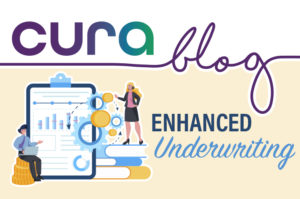What are the benefits of enhanced underwriting?
Request a Callback
By clicking on submit I / We give consent for you to call me / us on the number provided to discuss my / our financial requirements.
Caring - Understanding - Reliable - Advice
Home » Guides & News » What are the benefits of enhanced underwriting?
 What are the benefits of enhanced underwriting?
What are the benefits of enhanced underwriting?
Applying for insurance online in a matter of minutes is all well and good, but do you really know what you’re getting? And does the insurer really know the person they’re insuring?
Who doesn’t love a quick and easy process? Applying for insurance online using the likes of a comparison website might be what you prefer, or it could be that using a protection insurance adviser is the route you would like to take.
When it comes to using an adviser, such as us here at Cura, it can take a little more time as we aren’t just firing your application to an insurer, we are advising you on the policies that you need and the insurer that is right for you. It’s not just about the cheapest policy, there are lots of little extras that can come with these policies that can be really helpful if you know about them.
If you have a medical condition or something else that an insurer sees as a ‘risk’ it can lead to some extra assessments of your application. Though it might take a while longer, at Cura we actually see enhanced underwriting as a good thing. And why is that, you might ask? Let’s run through it.
To start off with, an application for protection insurance will have questions covering a range of things. You will first be asked for some basic details, such as your name, age and so on. The application will then go on to ask you about your current and past health, and family health history too. After that, you will be asked about your occupation and any hazardous pastimes that you take part in.
What are the positives of enhanced underwriting?
When you apply for protection insurance online, quite often your application might go to an automated system, which will then either accept, wait for an underwriter to review your details or decline your application based on information you give. Though this sounds quite normal, it doesn’t often take into account any specific details.
Enhanced underwriting will usually involve your application being assessed by a person, rather than an automated underwriting service. Although they will still have guidelines to follow, it’s much easier to give specific details which could end up having a big impact on the terms that you’re offered. For example, inputting a certain condition online might result in your application being declined, but might be considered given the opportunity to explain things.
Another part of enhanced underwriting involves the insurer requesting further information from yourself, or medical reports from your GP or other medical professionals that you’ve seen (with your consent). We have had medical reports completed by a GP and returned in a few days, but on the other hand we have also had reports take a few months to complete. I know, that sounds like a bit of a pain. But in the long run, we think it can be quite beneficial.
The request for a report from your GP usually comes in the form of a questionnaire. There will be a number of questions which could ask general questions about your health or more specific questions about a certain health condition, depending on what information the insurer feels like they need to know to assess your application.
Having received this information back from your GP, the insurer should then know quite a bit about your overall health and any health conditions you have or have had in the past. Though people might not be too sure about sharing their medical information, it does mean that if there is ever a claim, your application has been supported by evidence from your medical professionals, meaning that there should be not any queries of what you told the insurer about your health when you applied for cover.
As we have a lot of clients who have had health conditions, we’re quite used to enhanced underwriting and medical reports being requested. Our advisers are also trained to look through medical records to help determine which insurer is right for you. There are quite a few times where we have spotted errors in GP reports that have led people to be declined cover in the past, and by identifying this we have been able to get help get the records corrected and insurance in place.
As advisers, we want the best for our clients and believe it’s our duty to chase the progress of the application and keep our clients updated as much as possible (or as little as wanted). Part of this involves us getting in touch with insurers and doctors surgeries to make sure reports are being completed in a good time. Speaking with your GP surgery requires a very fine balance as we are supporting you as much as possible, but we are incredibly conscious that GPs are under significant pressure and we do not want to add to this.
We support you every step of the way on your insurance journey. Through assessing your needs, finding the right insurer, placing your application, liaising with GP and working alongside the insurer, our team is here to get you the protection that you need.
Related blogs
Categories: Access to insurance
Client Reviews








Talk to a Friendly Adviser
Get a Quote
What We Offer?
- Experienced and knowledgeable advisers
- Specialist advice with no fees to pay
- Full assistance with all of your paperwork
- Put your policy into trust at no cost
- A dedicated insurance adviser for you
Our Recent Awards



























